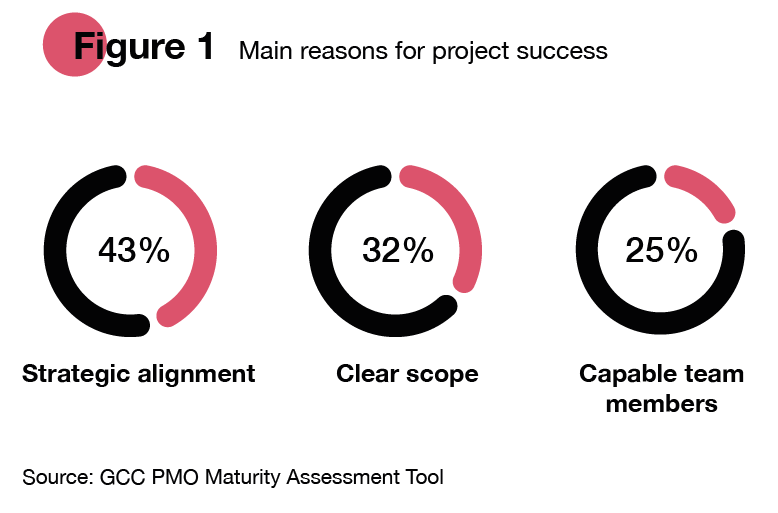As transformation accelerates in the Middle East, regional leaders are pushing the boundaries of technological possibility and human imagination to pursue audacious goals and create knowledge-based and sustainable economies. Saudi Arabia’s Vision 2030 will bring to life NEOM and the reimagined industrial city Oxagon, while the UAE’s Vision 2071 aims to make the UAE the best country in the world leveraging advanced technology, reforms in education and space exploration. PwC’s 26th Annual CEO survey found that 61% of CEOs in the Middle East believe that economic growth will improve in 2023, compared with more than half in all other regions that predict a decline.
As organisations adapt and evolve with this transformation, Project Management Offices (PMOs) must evolve to support digitisation, localisation, national capability development, and ESG reform within business entities to support national vision strategies and deliver value-based outcomes.
Organisations with advanced PMOs achieve better business outcomes than organisations with less mature PMOs, including revenue growth, customer satisfaction and ESG metrics. Therefore, accelerating the maturity of their PMOs needs to be a priority for organisations that want to improve outcomes and deliver greater value from projects.
PMO Maturity has multiple critical dimensions, ranging from governance to stakeholder engagement to human resources.This report examines the current state of PMO maturity in the Middle East, focusing particularly on the ‘softer’ side of project management and how PMOs can accelerate their impact by focusing on better communication, collaboration and development in the following areas:
People, culture and skills: Developing highly skilled and motivated project teams
Developing an effective project management culture, not only in the PMO but also across the wider organisation, is a key enabler for the success of the PMO function. In the Middle East, one-quarter of organisations think the capabilities of team members are the main contributing reason to project success (Figure 1). PMOs can support more value-driven and resilient cultures, which maintain a focus on the critical organisational outcomes they want to achieve from project delivery.

Stakeholder engagement: Forming effective partnerships
People deliver projects, and PMOs are vital in helping a wide range of stakeholders work together in synergy, contributing to the same goals and objectives.. Often with a broad view across the project portfolio, PMOs are well placed to use their influence to align teams to the overall objectives and maximise the value delivered, aligning with the organisation's strategic goals. But to do so, PMOs must ensure the needs of the teams and its stakeholders are embedded into the PMO’s processes at every stage.
94% of the most mature PMOs globally are constantly aligning initiatives and KPIs to the wider organisation’s critical strategic goals (compared to just 39% of Middle East PMOs)
Strengthening leadership support of the PMO: Empower PMOs to better support decision making
C-suite support is a hallmark of the most mature PMOs globally. Strong links between the PMO and senior leadership are mutually beneficial, empowering the PMO and maintaining its alignment with the organisation's strategic objectives, while improving the leadership’s ability to make evidence-based and data-driven decisions.
Without this mandate from the C-suite, PMOs can struggle to have their desired impact. Around 67% of Middle East organisations surveyed by PwC see a need for more leadership support as one of the main obstacles to an effective PMO, with 40% choosing this as the number one obstacle.
Call to action
As we navigate the challenges of a region primed for transformation, it is crucial to unlock the value of the PMO and drive it toward a more supportive and strategic role. Highly skilled project managers can be key advisors to organisations in the Middle East, faced with the challenge of developing a positive work culture, skills shortages, and the need for greater stakeholder alignment.

Visit our GCC PMO Maturity Assessment Tool to evaluate the maturity level of your organisation’s PMOs and create a benchmark to measure performance.
The Journey to PMO Maturity in the Middle East ( AR report)
رحلة نضوج مكاتب إدارة المشاريع في الشرق الأوسط
Contact Us
Khalil Alhares
Transformation Management Unit Director, PwC Middle East













